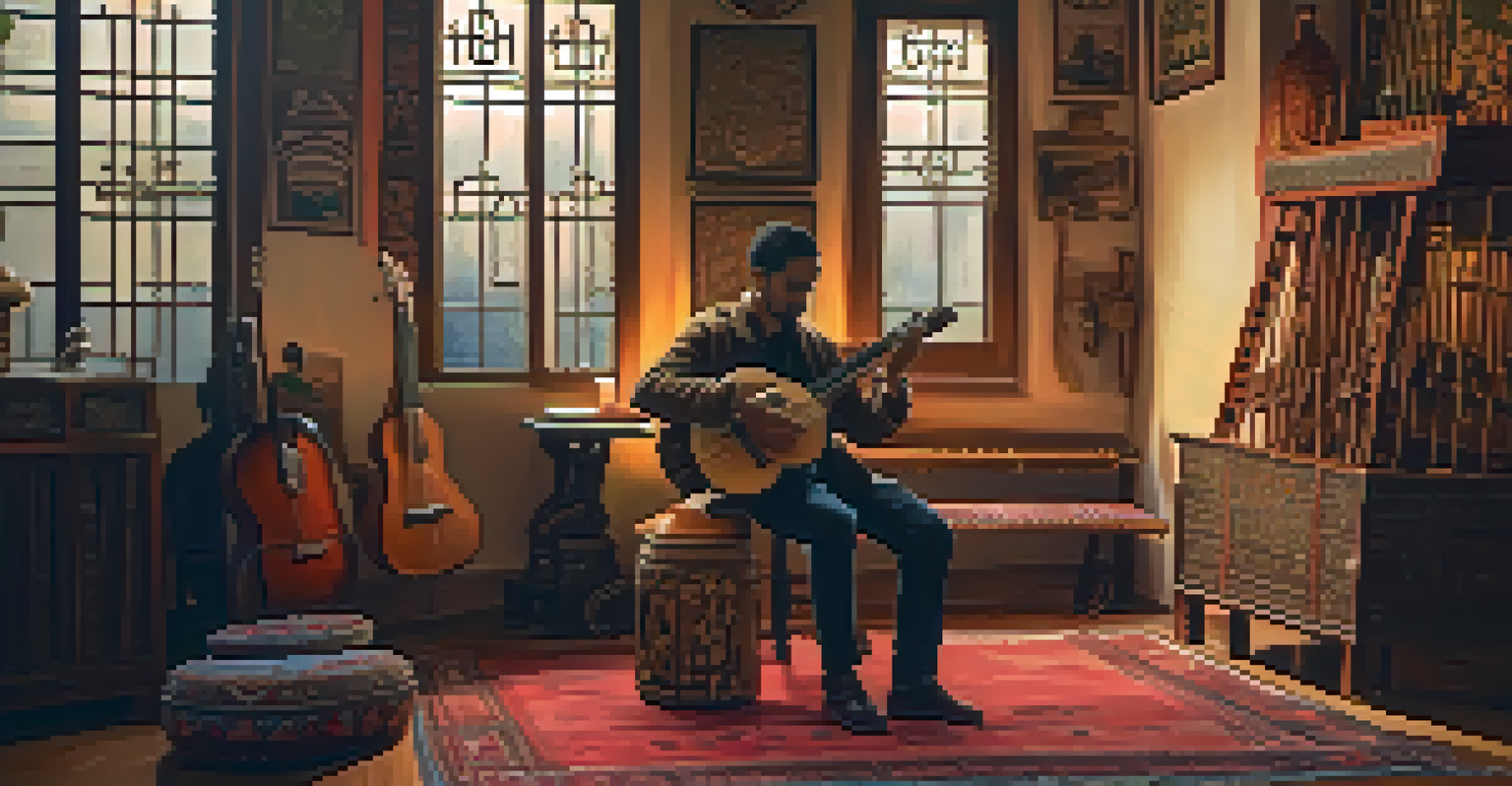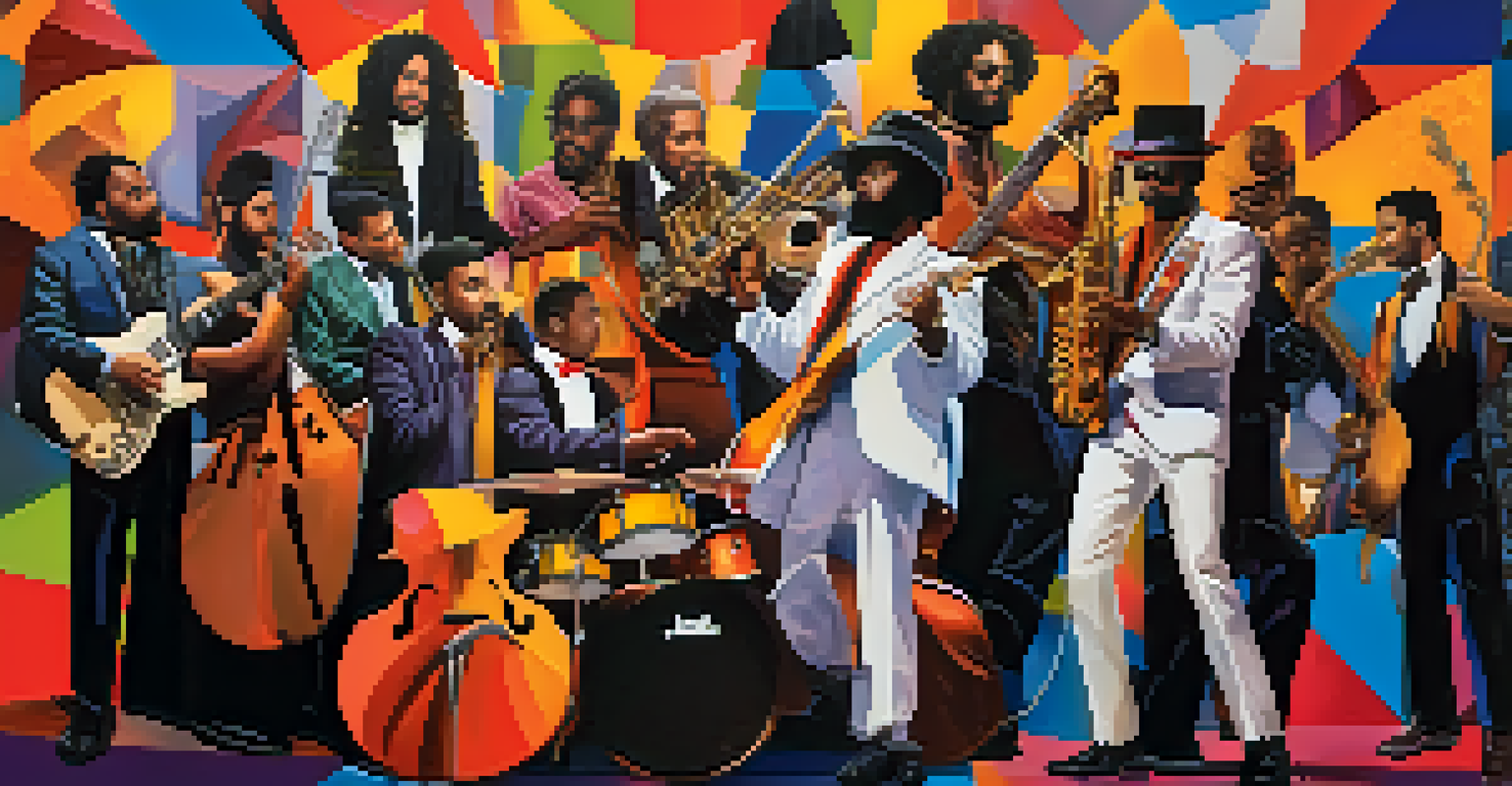How Music Reflects and Shapes Cultural Narratives

The Role of Music in Cultural Identity Formation
Music serves as a powerful tool for expressing cultural identity, allowing individuals to connect with their heritage. For example, traditional folk songs often carry the stories and values of a community, making them vital for cultural preservation. This connection to music helps people feel a sense of belonging, especially in multicultural societies where various traditions coexist.
Music is the shorthand of emotion.
Moreover, contemporary genres like hip-hop and reggae have roots in specific cultural movements, showcasing the struggles and triumphs of those communities. These genres not only celebrate identity but also foster dialogue about social issues, reflecting the lived experiences of diverse groups. As we listen to these sounds, we gain insights into the cultural narratives that shape our world.
In essence, music acts as a mirror, reflecting the values and stories of the cultures it originates from. By engaging with different musical styles, we can appreciate the rich tapestry of global cultures and learn about perspectives that differ from our own. This process ultimately contributes to a more inclusive understanding of identity.
Music as a Historical Document of Cultural Events
Throughout history, music has served as a record of significant cultural events, capturing the essence of moments that define societies. An example would be protest songs from the civil rights movement, which expressed the struggles and aspirations of a generation. These songs not only documented the events of the time but also inspired action and solidarity among listeners.

Moreover, music can encapsulate the emotions surrounding pivotal moments, from wars to celebrations. Consider how national anthems evoke feelings of pride and unity during significant events, like the Olympics. These musical pieces become intertwined with the collective memory, serving as reminders of shared experiences.
Music Reflects Cultural Identity
Music serves as a powerful expression of cultural identity, helping individuals connect with their heritage and fostering a sense of belonging.
By examining the music born from specific historical contexts, we gain a deeper understanding of cultural narratives and the emotions tied to them. Each note and lyric can transport listeners back to a time of struggle, joy, or change, reinforcing the idea that music is not just art but a vital record of our shared history.
How Music Influences Social Change and Movements
Music has long been recognized as a catalyst for social change, providing a voice to the voiceless and rallying support for various movements. For instance, the songs of Bob Dylan and Joan Baez were instrumental during the anti-war and civil rights movements, capturing the spirit of the times and inspiring action. Through their lyrics, these artists addressed injustices and sparked conversations that led to tangible change.
Without music, life would be a mistake.
In today's digital age, music continues to play a critical role in social activism. Platforms like TikTok and Spotify can amplify movements, with songs becoming anthems for causes ranging from climate change to racial justice. The instant accessibility of music allows for rapid sharing of these messages, reaching audiences far and wide.
Ultimately, music not only reflects cultural struggles but also shapes them by fostering community and solidarity. When people come together to sing or listen, they create a shared experience that can motivate action, amplify voices, and drive change in society.
Cultural Exchange Through Global Music Collaborations
In our interconnected world, music often serves as a bridge between cultures, promoting understanding and collaboration. Global music collaborations, such as those between artists from different backgrounds, showcase the beauty of cultural exchange. For example, the fusion of Afrobeat and pop has resulted in chart-topping hits that celebrate diverse influences and create new musical landscapes.
These collaborations often challenge cultural boundaries, inviting listeners to experience sounds they might not have encountered otherwise. When artists from various traditions come together, they create a unique blend that honors their roots while also pushing the envelope of creativity. This not only enriches the music itself but also fosters a greater appreciation for different cultural narratives.
Music Documents Historical Events
Throughout history, music has acted as a record of significant cultural events, encapsulating the emotions and narratives tied to pivotal moments.
Moreover, such exchanges can lead to a more inclusive music industry, where diverse voices are heard and celebrated. As listeners, we benefit from this cross-pollination of genres, gaining insight into the stories and experiences of others. In this way, music becomes a unifying force, weaving together the narratives of our global community.
The Emotional Impact of Music on Cultural Narratives
Music has a profound emotional impact, often influencing how we perceive cultural narratives. A poignant melody can evoke memories and feelings that connect us to our past, forming a bond with our cultural heritage. For instance, lullabies sung by our parents can trigger a sense of nostalgia, linking us to our family history and traditions.
Additionally, music can act as a form of therapy, helping individuals navigate their emotions and experiences. This emotional connection allows listeners to engage with cultural narratives on a deeper level, fostering empathy and understanding. When we hear a song that tells a story of struggle or triumph, we are invited to reflect on our own lives and the larger human experience.
As we explore the emotional landscapes of different musical genres, we gain insights into the diverse narratives that shape cultures. By feeling the music, we not only appreciate the artistry but also connect with the stories behind it, enriching our understanding of the world around us.
The Role of Technology in Shaping Music and Culture
Technology has dramatically transformed how we create, share, and experience music, significantly influencing cultural narratives. From vinyl records to streaming platforms, each advancement has changed the landscape of the music industry. Today, artists can reach global audiences at the click of a button, allowing cultural stories to spread faster and wider than ever before.
Moreover, technology enables new forms of musical expression, blending genres and styles in ways that were previously unimaginable. For instance, the rise of electronic music has given birth to a myriad of sub-genres that reflect modern culture's diversity. This evolution in sound mirrors the changing dynamics of society, showcasing how music adapts to and represents contemporary life.
Technology Shapes Music's Future
Technological advancements are transforming how music is created and shared, influencing cultural narratives and expanding artists' reach globally.
As technology continues to evolve, so too does the relationship between music and culture. By embracing these advancements, artists can connect with their audiences on a personal level, fostering a shared understanding of cultural narratives. This synergy between technology and music ensures that cultural stories remain relevant and engaging for future generations.
The Future of Music and Cultural Narratives
As we look to the future, the relationship between music and cultural narratives is poised for exciting evolution. With ongoing globalization and the rise of virtual reality experiences, music will continue to serve as a platform for sharing diverse stories. This opens up new possibilities for artists to explore and express their cultural identities, creating a richer musical landscape.
Additionally, as younger generations become more engaged in social and cultural issues, we may see a resurgence of music as a form of activism. The melodies that accompany movements for equality and justice will likely evolve, incorporating new styles and influences that reflect the current climate. This adaptability ensures that music remains a vital component of cultural expression.

Ultimately, the future of music is bright, filled with opportunities to connect, inspire, and tell the stories that shape our world. By embracing innovation while remaining rooted in tradition, music will continue to reflect and shape the cultural narratives that define us, uniting people across boundaries and generations.